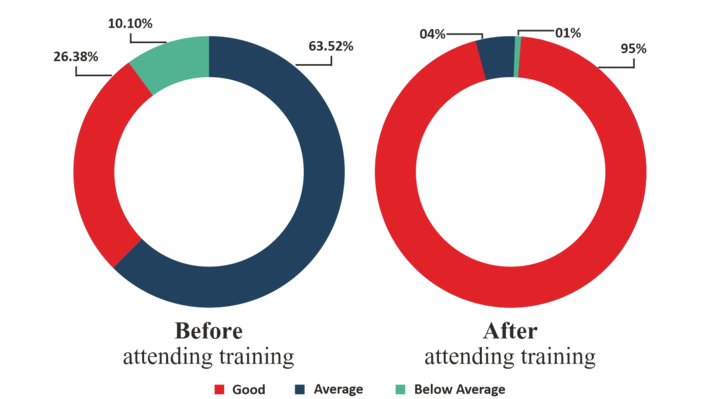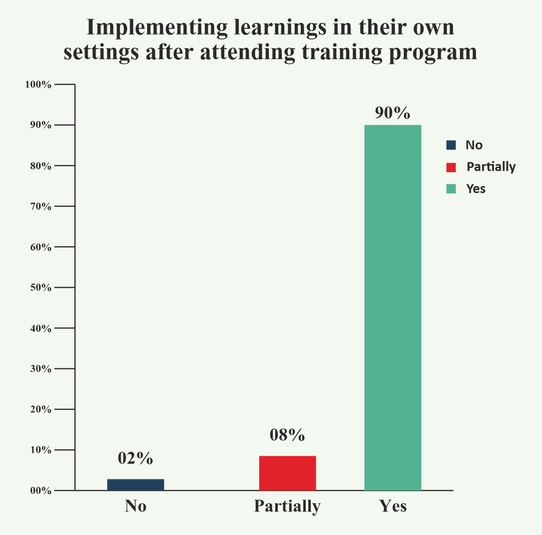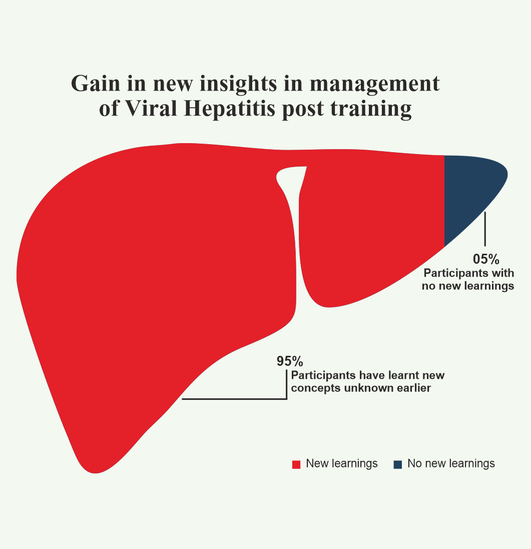TOPICS | PARTICIPANT’S RATING | ||
GOOD | AVERAGE | BELOW AVERAGE | |
Viral Hepatitis A – E | 92 | 7 | 1 |
Viral hepatitis in Special Population | 91 | 8 | 1 |
Mental Health in Viral Hepatitis | 88 | 11 | 1 |
Infection Prevention & Control Practices | 94 | 5 | 1 |
More than 90% participants indicated, that the scientific content delivered is balanced, objective and evidence based. 7% person found the content average and only 1% gave a below average rating for the content.

Before attending the training, 10.10% participants consider themselves to have below average clinical confidence whereas 63.52% consider themselves to have average clinical confidence in managing viral hepatitis patients. The comprehensively designed training program helped the participants to have increased clinical confidence related to the management of viral hepatitis patients. Approximately 95% of the participants reported to have good or excellent clinical confidence in management of the patients suffering from viral hepatitis. The participants also showed improvement of over 73% in better adoption of infection prevention and control practices after attending the training program.

A comprehensive training for doctors, nurses and laboratory technicians (separate) on viral hepatitis and infection prevention is conducted on regular basis under project PRAKASH. The training covered topics under five broad themes mentioned below:
The training was designed meticulously in such a way that it covers all the important topics in limited time frame. Approximately 95% of the participants acknowledged that they have learnt something new during the training program and learnings from the training will be beneficial to them in managing the viral hepatitis patients at their workplace. They will also be able to implement standard precautions guidelines to ensure safety of both patients and themselves.
The feedback of training on viral hepatitis & its complications conducted for healthcare workers also assessed the possibility to practice the learnings from the training at their workplace thereby improving treatment outcome of patients with viral hepatitis. To this, 90% stated that it is possible for them to practice the learnings from the training program at their workplace with improved and better implementation of infection prevention guidelines. Approximately 08% mentioned that they can partially utilize the learnings from the training program to their practice desk whereas 2% stated that they won’t be able to practice the learnings of the training program at their workplace.
Hence, the overall feedback of the training indicates improvement in HCWs knowledge, attitude and practice in management of viral hepatitis. It also indicates change in their practice towards following infection prevention guideline. The new learnings from the various sessions will help these HCWs in better treatment outcomes in their patients. It will also help them in avoiding percutaneous injuries at workplace by adhering to standard precaution guidelines.



Call us now

Drop us an email

Monday to Saturday
